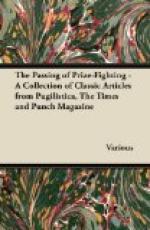England!—the fair betrothed
was born
Within the seas that bind
us;
Home!—not from far court-precincts
torn,
This Princess comes to find
us.
Beauty!—well, look upon that
face,
Whilst PUNCHIUS Cupid hovers,
With crowning wreath and genial grace,
Above the Royal lovers.
Fair home-grown flower, bright English
MAY,
Whose promise cheers December,
And who will make “wild March”
so gay;
Punch can right well
remember.
Betrothals many, bridals too,
Your lover’s sire’s
among them,
And with a loyalty frank yet true
Has generally sung them.
And so for you he bath a stave,
Latest of the bright bevy.
On gentle hearts and spirits brave
The toll of love you’ll
levy.
We trust that fortune may prove fair,
And life’s long pathway
rosy,
And love attend the Royal pair,
The young “Promessi
Sposi.”
An English bridal it will be
When March brings round the
spring time,
And English hearts will hail with glee
The coming of the ring-time.
Punch—like his Prince—is
“proud to think”
It then will be his duty,
Once more the fine old toast to drink—
“For England, Home,
and Beauty!”
* * * * *
TWOPENCE PLAIN.—A PENNY COLOURED.
MR. PUNCH, HONOURED SIR,
I have just received a copy of The Almanack, which, if I may say so, is worthy of the approach to the close of “the so-called Nineteenth Century.” Not to go further into particulars, I should say that “A Doll’s Diary” will be hard to beat in contemporary Christmas literature.
It was, Sir, not with the intention of making this obvious remark that I break in upon your reflections. My purpose was moved by discovering on the front corner of this work of Literature and Art the legend, “Price 6d.; Inland postage, 2d.” Looking at the postal cover which lightly bore the treasure o’er land and sea to this ancient town, I discovered, that coming under the “foreign postage rate,” 11/2d. had served the turn. Whence it appears, that had I, as usual at this season of the year, been at my country address, to be found in Dod, the Almanack would have cost me, or someone else (it is beside the argument), 2d. Whereas, being hundreds of miles away from the placid pastures that surround The Kennel, Berks, the postage is 25 per cent. less in amount. In one case, where the larger sum and the less amount of labour were concerned, the English Post-Office, taking all the money, charge 2d.; in the other, calling in the assistance of Belgium and Germany, and of course sharing with them the plunder, 11/2d. is held to be the fair recompense for the immensely extended labour. Isn’t this something in the way of reversal of the ordinary trade axiom, as who should say “Twopence Plain; a Penny, Coloured”?




